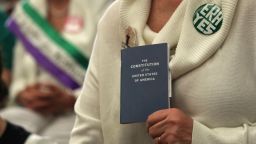Editor’s note: Sara Stewart is a film and culture writer who lives in western Pennsylvania. The views expressed here are her own. View more opinion on CNN.
Imagine, if you will, seeing this headline: “Jon Hamm is happy as a man without kids: ‘I’ve had a great sexy-ass life.’”

Sounds vaguely ridiculous, right? Aside from the fact that Hamm, 52, does seem to have a sexy-ass life, who cares if he has kids? (In a 2016 interview, the “Mad Men” star didn’t seem super into it, but who can say?)
Male actors who choose childlessness almost never get breathless media attention. Patricia Clarkson, on the other hand, who is 63, was mentioned everywhere last week after she gave that exact quote to the “Table for Two With Bruce Bozzi” podcast.
It’s a real marker of how far we haven’t come on the issue of chosen childlessness that an offhand comment from a woman in the public eye still gets so much notice. In an era that’s seen horrendous harm to reproductive rights in this country after the fall of Roe v. Wade last year, it’s unsurprising but still infuriating that a woman publicly saying she doesn’t want kids is a big deal.
Clarkson’s certainly not the only celebrity to talk openly about choosing not to have kids. Other vocally child-free stars — Helen Mirren, Oprah Winfrey, Dolly Parton, Kim Cattrall and many more — have been saying this stuff on the record for decades. And like clockwork, their words nearly always end up in a headline.
Chelsea Handler’s pitch-perfect sketch “A Day in the Life of a Childless Woman” evoked a predictable outcry from conservative male pundits this year. (One childless male star who has gotten attention is Seth Rogen, who told Howard Stern that “I don’t know anyone who gets as much happiness out of their kids as we get out of our non-kids.”)
But something does feel a bit different at this particular moment. If there’s a glimmer of hope in the reaction to Clarkson’s comments, it’s that she’s comfortable saying she always knew she wanted a different path: “I made a big choice. But I knew it when I was young,” she told Bozzi. In another interview, she worded it differently: “I’ve never wanted to marry, I’ve never wanted children — I was born without that gene.”
The idea that some women just don’t have a maternal instinct is gaining traction, especially as younger generations increasingly embrace childlessness. A recent book by British author Ruby Warrington, “Women Without Kids: The Revolutionary Rise of an Unsung Sisterhood,” explores this idea in detail.
She asks: “What if, rather than motherhood being every woman’s natural, God-given role, some of us, regardless of our biology, are simply more suited to the role and the vocation of parenthood than others?” Instead, she argues for a “motherhood spectrum”; the spectrum theory “does away with the notion that not being a mother, or not naturally reveling in the role means that there is something wrong with us.”
Warrington, who’s credited with coining the term “sober curious,” has come up with another that I’m hoping catches on: “areproductive,” used as a less-polarized word than “childless” or “child free” to describe women who simply never had the urge to have children.
The reasons many women cite for not wanting kids are, to be sure, frequently circumstantial: a rapidly downward-spiraling climate, lack of a societal safety net for motherhood, the erosion of reproductive rights. But the majority of Generation Z and millennial respondents who are choosing not to have kids, according to a recent Pew Research Center Survey, report that they “just don’t want to.” That’s reflective of the seismic shift Warrington’s talking about. “What if not all of us are supposed to have kids,” she writes, “and what if this were considered the norm?”
Still, it’s frustrating that even outspoken women such as Clarkson self-flagellate about motherhood, even as they extol the lives they’ve been able to live without being mothers: In her podcast interview, Clarkson also discusses thinking she wouldn’t be a good enough mother.
“I grew up with great parents who sacrificed everything for me,” she said. “And you have to really be committed to having children. You have to be a great parent, and I was afraid I couldn’t be.” The whole enterprise of motherhood seems (to this childless woman, anyway) like it’s never been more stressful, and the idea that there is any way to be a perfect mother is, of course, impossible.
The scale at which more women are opting out of motherhood has given rise to a heated global debate about declining birthrates. On the one hand are arguments about the catastrophic implications for the functioning of society under an aging population; on the other are theories that a shrinking number of humans will actually be good news for the badly damaged planet and even the economy. But so far, I have yet to see a compelling, widespread case being made for a massive overhaul of our treatment of mothers, and child care, as the means to convince skeptical women to sign on.
On the contrary, the anti-choice stance seems to be that the way forward is just to force women into motherhood in a “Handmaid’s Tale”-adjacent way. Given the breathtaking speed with which conservatives are eroding women’s access to reproductive care and family planning, it doesn’t seem hyperbolic to say that the endgame is to compel every woman to be a mother if at all possible — no matter that, increasingly, it’s obvious that a certain percentage of them do not feel it’s right for them.
Supposedly “pro-life” people rarely acknowledge the exhausting, often thankless lives of women who do choose to have children. As one child-free woman told HuffPost in 2021, “I think Americans need to get it through their heads how awful the safety net is here: bad health care, unsafe schools and streets, no child care, minimal parental leaves or sick leaves, nor job security.”
The patriarchal fervor is blatantly at odds with societal trends and those declining birthrates, including the increasing prevalence of women saying they’re just not made for motherhood.
That level of obliviousness is not new for conservatives — they’re regularly wildly out of touch with what the majority of Americans want, and that includes the right to an abortion — but there’s a tiny bit of hope that this will come back to bite them in the 2024 election. And that someday soon, it won’t even be news when a woman such as Clarkson shares the joy of non-motherhood.





